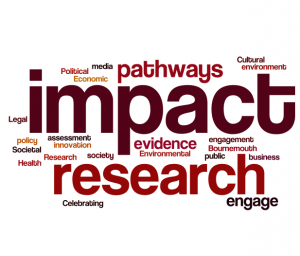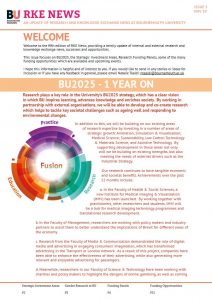
Demonstrating impact is becoming an increasingly normal part of academic life, with changes in the external environment underpinning the need to show how research is making a difference beyond academia. As well as forming a significant part of a university’s REF submission, impact pathways are often included as a routine part of funding applications.
In order to support impact development at Bournemouth University, an impact fund was established in spring 2019, overseen by the Research Impact Funding Panel.
For 2019/20, the Research Impact Fund has been split into three strands with a total of £50,000 available:
- Strand 1: To support the development of new research partnerships and networks, to lay the groundwork for future research projects
- Strand 2: To provide support for emerging impact from existing underpinning research
- Strand 3: For the development of impact case studies for REF2021 – now closed
We are pleased to announce another open call for applications for strands 1 and 2.
The first call for applications for strands 1 and 2 resulted in eight successful awards, which are currently underway. The outcomes of the second call for applications for strand 3 are due to be announced soon.
Eligibility
Strand 1: To support the development of new research partnerships and networks, to lay the groundwork for future research projects
This strand is aimed at those who are new to research (academic staff who have not published an academic output, or received internal or external funding for research) such as Early Career Researchers (those who are within 7 years of completing their doctorate, or equivalent experience, and are not Associate Professors / Professors). The funding aims to support colleagues to engage with key stakeholders at the very beginning of the research process, to establish partnerships and networks to support the co-creation of research questions.
There is £11,000 available in total for this funding strand. From this £11,000, the panel hope to fund multiple projects and would particularly welcome applications for smaller projects up to £2,500.
Strand 2: To provide support for emerging impact from existing underpinning research
This strand is aimed at academic staff who have evidence of existing underpinning research which has the potential for impact, or is starting to result in impact. The funding aims to support the development of research impact across BU and begin to identify potential case studies for post-REF2021 exercises.
There is £5,000 available in total for this funding strand. From this £5,000 the panel hope to fund multiple projects and would particularly welcome applications for smaller projects up to £2,500.
Application process
To apply, please read the policy, application form and guidance. Applications must be submitted to researchimpact@bournemouth.ac.uk by 5pm on Thursday 12 December.
If you have any questions about your application please email either Rachel Bowen (for HSS or FM queries) or Genna del Rosa (for FMC or SciTech queries).
Support for applicants
The Panel strongly recommends that applicants speak with their Faculty Impact Officer and/or relevant Unit of Assessment leads / impact champions prior to applying. If you are unsure who this is, please contact your Faculty Impact Officer in the first instance:
You can also seek advice from the following RDS colleagues when developing your application:
The Panel members will also be available to answer any queries and discuss ideas at a series of lunch time surgery sessions:
| Tuesday 19 November |
Lansdowne Campus – B224 |
12:30 – 13:30 |
| Thursday 21 November |
Talbot Campus – P402 |
12:30 – 13:30 |
| Monday 25 November |
Talbot Campus – P411 |
12:00 – 13:00 |
| Wednesday 27 November |
Lansdowne Campus – B202 |
12:00 – 13:00 |
| Monday 2 December |
Lansdowne Campus – EB303 |
12:30 – 13:30 |
| Thursday 5 December |
Talbot Campus – F206 |
12:30 – 13:30 |
| Tuesday 10 December |
Talbot Campus – F304 |
12:30 – 13:30 |
| Wednesday 11 December |
Lansdowne Campus – TBC |
12:00 – 13:00 |
BU’s Research Principles
Putting the Research Impact Fund into strategic context, under BU2025, the following funding panels operate to prioritise applications for funding and make recommendations to the Research Performance and Management Committee (RPMC).
There are eight funding panels:
- HEIF Funding Panel
- GCRF Funding Panel
- Research Impact Funding Panel
- Doctoral Studentship Funding Panel
- ACORN Funding Panel
- Research Fellowships Funding Panel
- Charity Support Funding Panel
- SIA Funding panel
Please see further announcements regarding each initiative.
These panels align with the BU2025 focus on research, including BU’s Research Principles. Specifically, but not exclusively, regarding the Research Impact Funding Panel, please refer to:
- Principle 5 – which sets of the context for such funding panels,
- Principle 6 and Outcome 9 – which recognises the need for interdisciplinarity and the importance of social science and humanities (SSH).

 Every BU academic has a
Every BU academic has a  By clicking on this box, on the left of the Research Blog home page just under the text ‘Funding Opportunities‘, you access a
By clicking on this box, on the left of the Research Blog home page just under the text ‘Funding Opportunities‘, you access a 

 An
An  The latest issue of RKE News is
The latest issue of RKE News is  If you’re an arts and humanities early career researcher who has applied to Round 4 (or thinking of applying to future rounds) of the
If you’re an arts and humanities early career researcher who has applied to Round 4 (or thinking of applying to future rounds) of the 

 With the aid of QR funding (Faculty of Management), I conducted field-research in Ubud, Indonesia in July 2019. I went into the field with two research questions, linked to poverty alleviation and sustainable community development. What is the impact of spiritual/wellness tourism on local people and communities in Ubud? What are the strategies that can help provide micro-entrepreneurship opportunities for the poor? I interviewed multiple stakeholders including a former Indonesian Minister of Tourism, a spiritual leader in Ubud, a representative of the Ubud home stay association, local yoga teachers and other private/public stakeholders. I also talked to a representative of a rural orphanage.
With the aid of QR funding (Faculty of Management), I conducted field-research in Ubud, Indonesia in July 2019. I went into the field with two research questions, linked to poverty alleviation and sustainable community development. What is the impact of spiritual/wellness tourism on local people and communities in Ubud? What are the strategies that can help provide micro-entrepreneurship opportunities for the poor? I interviewed multiple stakeholders including a former Indonesian Minister of Tourism, a spiritual leader in Ubud, a representative of the Ubud home stay association, local yoga teachers and other private/public stakeholders. I also talked to a representative of a rural orphanage.

 As usual, RDS will host an annual UK Research Office visit to BU in 2019. This year’s event has been scheduled for November; the reason is obvious – Brexit!
As usual, RDS will host an annual UK Research Office visit to BU in 2019. This year’s event has been scheduled for November; the reason is obvious – Brexit!










 Seeing the fruits of your labour in Bangladesh
Seeing the fruits of your labour in Bangladesh Exploring Embodied Research: Body Map Storytelling Workshop & Research Seminar
Exploring Embodied Research: Body Map Storytelling Workshop & Research Seminar Marking a Milestone: The Swash Channel Wreck Book Launch
Marking a Milestone: The Swash Channel Wreck Book Launch No access to BRIAN 5-6th February
No access to BRIAN 5-6th February ECR Funding Open Call: Research Culture & Community Grant – Application Deadline Friday 12 December
ECR Funding Open Call: Research Culture & Community Grant – Application Deadline Friday 12 December MSCA Postdoctoral Fellowships 2025 Call
MSCA Postdoctoral Fellowships 2025 Call ERC Advanced Grant 2025 Webinar
ERC Advanced Grant 2025 Webinar Update on UKRO services
Update on UKRO services European research project exploring use of ‘virtual twins’ to better manage metabolic associated fatty liver disease
European research project exploring use of ‘virtual twins’ to better manage metabolic associated fatty liver disease